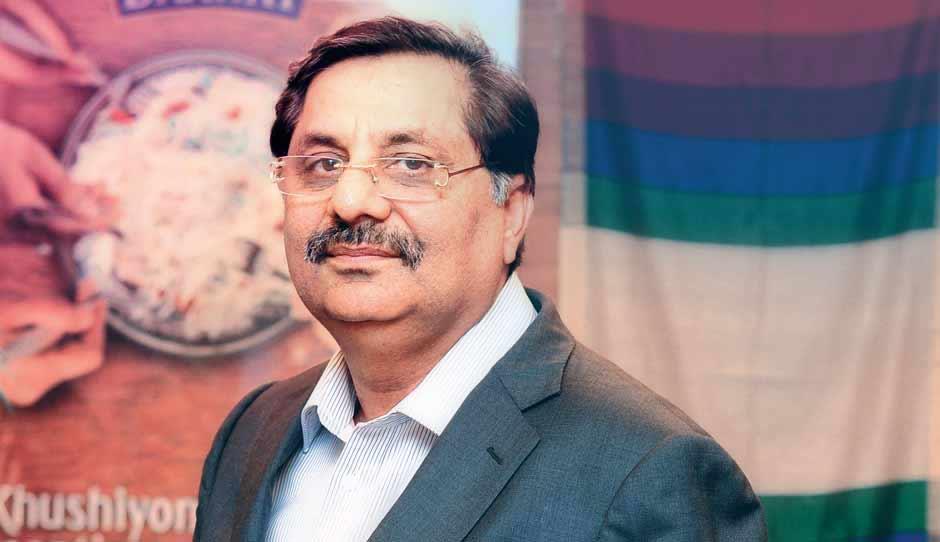How LT Foods' Vijay K Arora Became the Rice Baron of India
- BY Sonal Khetarpal
 In
In  33613
33613 0
0

From a small family concern, Vijay Kumar Arora has grown LT Foods into a leading processor and exporter of packaged basmati rice. Like Daawat, their immensely popular basmati rice brand, LT Foods today has several premium rice brands in its portfolio. Plus, business continues to grow healthily for the company which now plans to move into nutritious rice-based snacks. Even as new plans are being sowed, the 1,100-people strong company is expecting to end this fiscal with a bountiful harvest of Rs 2,000 crore.
I wanted to be a doctor. I had got admission in a medical college in south India, but my family did not want me to leave home and venture out for studies. So, I settled for a Bachelors in Biology from Punjab University. But as I finished my graduation, I had no aspirations of building a career in science. Being the elder son, I joined my father’s business of rice trading in Khalra, a small district in Amritsar in 1978.
I worked under him for six years and learnt the basics of business—he taught me how to work systematically. Unfortunately, we lost him in the terrorist attacks in Mumbai in 1986, after which we moved our house and business to Sonipat, Haryana. The responsibility of the family and business came on to me. For the next few years, I learnt to manage the business and only took some conservative risks to expand it. But, the one plan I did conceive and wanted to execute was to export rice. Hence, it was in October 1990 that LT Foods, formerly known as LT Overseas, was incorporated. I named the firm after one of my forefathers, Lal Chand Tirath Ram Rice Mills but shortened it for better recall in the international market.
We started as one company but now we have six subsidiaries—Daawat Foods, Nature Bio Foods, and Staple Distributions Company in India; LT International and LTO Kusha Inc. in USA, and Sona Global Limited and Nice International in Dubai. Each concentrates on distribution of our different brands of rice and rice products to international markets. Our flagship product is the Daawat range of basmati rice targeted at the premium segment of the market, while the Devaaya, Rozana and Heritage range of basmati rice caters to mid-segment customers.
We have got many multi-million dollar export orders as we grew but I distinctly remember our first big order from Continental Grain Company, a US trading company and I did not know how to manage a Rs 30 crore order then, so I partnered with Bishan Saroop Ram Kishan Agro, a successful export house in India to execute the job and learn from them. Thankfully, we received great recognition for our high quality of rice. After that, we got a lot more orders, and in the first year itself, our turnover grew from Rs 1 crore to Rs 100 crore.
 Peer Power: Vijay Kumar Arora has learnt the value of learning from successful peers since he partnered with a leading export house to execute his first order.
Peer Power: Vijay Kumar Arora has learnt the value of learning from successful peers since he partnered with a leading export house to execute his first order. I was keen on growing the company and the Basmati rice business in the international market seemed to be a lucrative avenue. I independently liaised a lot more with farmers and engaged contract farmers to meet our growing orders. But, being from a small town, going abroad to look for clients and business wasn’t easy for me. I did not even know how to get a visa. Plus, one needs to understand different regulations and laws before you can start exporting. The one thing I did know was how to be determined. Every morning, I’d tell myself, I had to do this.
The export business was challenging to set up. For example, in 1995, I had a contract to export a $6 million order to Syria. But, the Central Laboratory of Syria that examined our samples rejected our container on the pretext that “it did not meet the required specifications”. I flew to Syria for three days. But, it took 15 days of running around to get the clearance for our order. In fact, every new contract we took on posed a new set of problems for us—new laws, buyers backing out at the last minute, or other myriad problems. Of course, each of these problems served us well. We learnt a huge lot from each of these experiences.
I was also intent on learning from others. I had started growing my social circle to network with people from successful business families. I wanted to understand how they conducted their business. If someone would give me an idea or advice, I would note it down and implement it from the very next day. I have been carrying a small diary in my wallet for the past 20 years. I use it to quickly jot down ideas and notes as and when I come across them.
It was at a social gatherings in Panipat that I chanced upon meeting V. K. Kapoor, who had recently retired from his family’s rubber business. He became my mentor and an advisor in the company. I relied on his wisdom on not only how to grow my business, but also how to manage family and social relationships. He really helped in my journey of getting more and more international exposure as well. He would travel around the world with me, attending food exhibitions, trade fairs and other seminars.
By 1995, we had become a Rs 250 crore company, and were growing rapidly. We even set up a milling facility (paddy to rice) of 4 MTPH in the same year at Sonepat. Even though my three younger brothers had joined the business by then, I was doing everything on my own. Mr Kapoor was extremely valuable in teaching me how to be a leader and work along with family members. In fact, it was on his insistence that I went to Administrative Staff College, Hyderabad for a two week leadership course in 1995. Initially, it was tough to leave the business and be a student but I have gotten used to it now. I have gone back there several times for different courses on HR and finance. I am going this year too for a programme in family-run organisations.
To be honest, I don’t think I handled the company’s growth spurt very well. We were becoming somewhat like an unsettled ship."
- Vijay Kumar Arora
Our next big milestone as a company came in the year 2000 when we launched a processing facility at Bahalgarh, Haryana. Soon,we became a Rs 400-crore company. This growth led to a drastic transformation for me because I had to hire a lot of experienced professionals from the industry. Initially, in spite of their experience, I could not trust them. As a result, I was not getting their best performance. I had to convince myself that the truism, only those who have invested money in the business feel the pinch, is not really true. Companies that run professionally, with no promoters, can be successful as well. Once I changed that mindset and understood that employees can be as passionate about work, I could see a dramatic rise in their efficiency.
To be honest, I don’t think I handled the company’s growth spurt very well. We were becoming somewhat like an unsettled ship. I thought I’d put pressure on myself to steer it back to control. “Pressure techniques” have always worked for me—they spur me to give my best. So, I decided to go public although my family, friends and advisors were against this decision. To me, the rationale was clear. I was losing grasp of the company’s reins, and I needed somebody to help control me, in this case, the shareholders. Fortunately this worked for us. Since we registered the company in 2006 at the Bombay Stock Exchange and the National Stock Exchange, we have been growing at almost 20 per cent every year.
Going public also brought a revolution in the organisational structure. Initially, the whole business was one big entity, controlled by a strong centre. After going public, in addition to bringing in professionals in all key departments, each of the six subsidiary companies were headed by a professional CEO. Gradually, the company became a professional organisation where decisions were taken as a group. Different teams were involved in the decision making process from the conceptual stage. Of course, to make sure we were able to attract the best talent, we paid salaries much over the industry benchmark. I’m glad we took that chance because over the past few years, we’ve been able to get some great people to be associated with LT Foods.
The greatest part of running a company is totting up these memorable milestones. For example, one of the greatest moments for me was when we acquired Kusha, an American rice trading company. Its Royal brand had a 40 per cent market share in the basmati rice segment in the US. When I had first met the owner of the company, he’d refused to negotiate the deal with me saying I did not have sufficient funds to buy his company. But, I was determined to acquire them. I approached investment bankers to help me out, even though frankly, I didn’t even know then what exactly investment bankers did! In fact, the first few investment bankers I approached refused to take this on. I gradually persuaded Avendus, the leading PE firm to accompany me to Los Angeles, where the company was based, to meet the owner. That set the process rolling, and in December 2007, we took over the company.
This was a big dream-come-true moment. I had first travelled to Los Angeles in 2001, and had absolutely loved the city. My dream from then on was to be able to own a company there. I know now that dreams, however fantastical they may seem, do become reality. And, a successful one at that—since buying it in December 2007, we have nearly doubled Kusha’s turnover. With this acquisition, our market share in the US market has grown from 7 per cent to 52 per cent. It gives me great pride that we are now in 50 locations throughout the world with five factories in India and two manufacturing units in the US and Dubai.
The 2000s have been frenetically paced for us. And, we’ve continually maintained pressure on ourselves. In 2009, three years after we went public, we also brought in private equity investment into LT Foods. Rabo Equity Advisors, the private equity arm of Rabobank, showed confidence in our organisation and invested Rs 50 crore (Rs 25 crore in LT Foods and Rs 25 crore in Daawat Foods, our subsidiary company). Of course, Rabo isn’t involved in the operational aspects of the business but they do provide us a lot of guidance. I’m glad we got PE investment. It’s important to have somebody from the outside guide you.
Post the PE infusion, the most significant move was that we made much greater investments in R&D. As a result, we diversified our product portfolio and launched six new variants in the basmati rice segment in January 2011 under our flagship brand Daawat. We also forayed into the healthy snack category with the brand MYMY (My Taste My Health) which offers rice-based chips and snacks. The same year, we also entered in public-private partnership with PUNGRAIN (the nodal agency on behalf of Punjab government) and ventured in grain storage and developed silos with 50,000 metric tonnes capacity in Amritsar.
All our initiatives are small steps for our long term plan—to transform LT Foods from a leading basmati rice company to a global speciality food company with a comprehensive range of products and services of the agricultural value chain—a straight from the farm to the kitchen approach.





























Add new comment